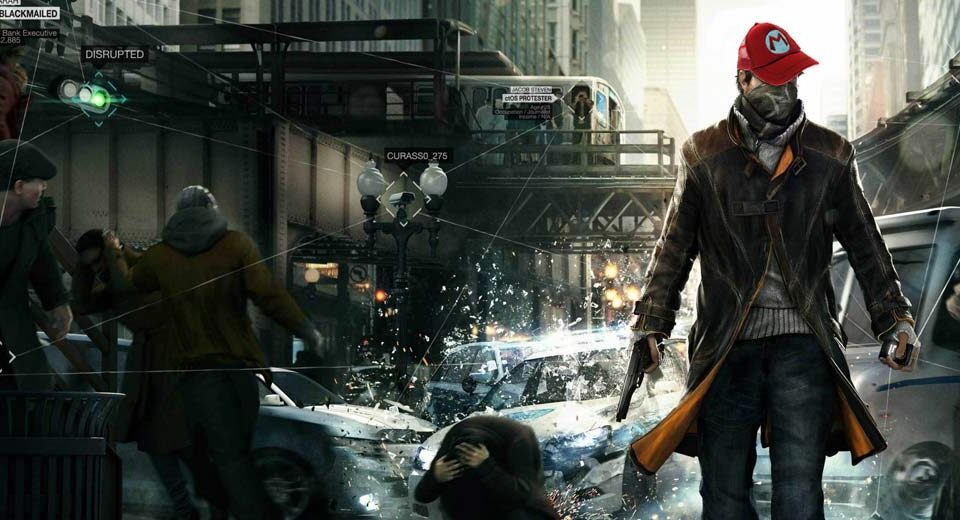The forthcoming coming Wii U edition of Watch Dogs being the last title of its kind they will bring to the platform.
Guillemot also points to low sales of the Assassins Creed series and I’m sure other studios could pick their own examples. Activision’s Call of Duty games haven’t done too well, nor has Warner’s Batman franchise. And of course, going back to Ubisoft, the fantastic ZombiiU also struggled, despite being a launch title.
Considering the nature of Nintendo’s brand plus their well-documented woes with the Wii U, this comes as little surprise, even if it is something of a shame. Guillemot’s comments have, however, prompted a question. What does the term ‘mature’ mean for video games in 2014?
Guillemot didn’t say ‘mature rated’, so let’s assume he believes that the content of Watch Dogs is in some way more mature than that found in successful Wii U titles. A perfect example being Super Mario 3D World. Is one really more mature than the other? Let’s compare.
In Watch Dogs, the player assumes the role of a sulky generic chap who likes to appear mysterious by wearing a brown cap and a scarf around his face. Also adorned in a flowing trench-coat, he patrols the streets of Chicago, stealing cars and indiscriminately hacking into the personal affairs of the city’s inhabitants. Quite often he shoots people who get in the way of his vaguely defined revenge mission.
Meanwhile, Super Mario 3D World features a cartoon Italian plumber. He wears a big red cap and sometimes a cat-suit that lets him climb up walls. Mario goes on a vaguely defined adventure collecting coins and jumping on little monsters, called Goombas. On occasion he travels around in an over-sized ice skate boot.
I can’t argue that either game’s premise sounds particularly mature. One sounds like a disturbing nightmare and the other like a sulky teenager’s power fantasy. But I can argue that one is more mature than the other in terms of game-play, inventiveness, polish, solidity of experience and audience appeal. And that the other is derivative, buggy and owes its success to excellent marketing rather than ground-breaking design or its embarrassingly dull antagonist.
I’m not trying to suggest that one game is better than the other (although you all know which game is) but I do think it’s interesting how we can apply the term ‘mature’ to both titles. It demonstrates the difference between content that is mature and mature-rated content.
Any game that lets you murder people should rightly get a mature rating by the ESRB, but the narrative power-fantasy of Watch Dogs is juvenile at best. If the aim of video games is to challenge, entertain, delight the senses and tell new kinds of stories (as I hope it is), then there is only one winner. This comparison highlights the difference between a maturity of game design and the type of content that earns an M rating from the ESRB.
Although needed, the M rating sometimes feels little more than a badge of honour. It notionally warns parents that a particular game is graphic or violent but in reality it just makes these games all the more desirable for those too young to play them. When I was a kid, the thrill of getting my hands on an 18 rated VHS movie could not be surpassed. It was a forbidden pleasure and probably a very healthy thing for a confused and moderately rebellious 13 year old to do.
In truth, many M rated games are directly aimed at this ‘on the cusp’ audience. They offer an illusion of what it’s like to be grown up. For example, take the over-earnest and gratuitous Assassin’s Creed: Unity trailer. It’s readily apparent who this game is marketed at and it’s not grown ups. I’m a huge fan of the series and Unity is a title that I’m excited to play, but I’m also getting on a bit and can vouch that it’s not being marketed to me.
Perhaps a better rating would be ‘Dumb Fun’ (which is a perfectly good thing), or Pubescent Fantasy (again, cool), but I doubt these ratings would help sell many games.
Some titles straddle the divide. Grand Theft Auto V is an obvious example, as is Bioshock and, yes; plenty of Ubisoft titles make the cut too. Games that, although violent, are also well designed and conceptually smart. And, all things considered, Minecraft is probably the most mature game to be made in the last ten years.
I’m not really criticising Guillemot, but his comments draw attention to the fact that the term mature is now all but meaningless in the world of video games.
What makes a game mature for you? Is it the level of violence? The themes a game explores? Or its construction and design? For me, the likes of Pikmin 3 and Super Mario 3D World mean the Wii U is doing just fine for mature titles.







While I agree with what you said, I expect a backlash of commenters calling you a fanboy and out of touch. Good article though. I do believe kids are the ones mostly playing M rated games, while adults will enjoy anything that is fun. It was true when we were kids, and it will still be true when our kids have their own kids.
I really like the games that I am taking a slight poke at. In film it seems fine to say that, for example, Boyhood is more mature than Expendables 3, despite one being rated 18 and the other not. But in games, not so much.
I didn’t mean to be too critical of Ubisoft’s games (which I mostly love) but it did get me thinking about the term and what it means.